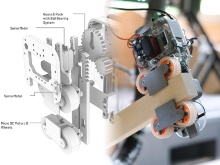Computational Design and Digital Fabrication
From Digital to Physical Computing
Recent developments in computational design methods, fabrication processes and robotic control open up new possibilities for design and materialization in architecture. Beyond automating traditional fabrication techniques, robotics affords the opportunity to explore adaptive, interactive, and responsive digital fabrication methods. The aim of the course is to develop skills and understanding for relevant techniques for fabrication-oriented design including advanced computational methods, artificial intelligence, and development and prototyping of custom electronics.
Throughout the course, students will be asked to engage practically with the curriculum through accomplishing short-term assignments in small groups. Where possible, synergies with the ITECH Research Pavilion (participation encouraged but not obligatory) are encouraged, which will enable students to investigate fabrication-oriented design in interdisciplinary teams as well as developing suitable computational design tools. The result of the investigations in this course will be a deeper understanding of the potential of robotic fabrication in architecture and proficiency in technologies for advanced fabrication of architectural systems, the development of computational tools, and experimental fabrication techniques.
Due to the online-teaching format, the focus in the first half of the semester will be on the computational methods that enable fabrication-oriented design and on software-prototyping. These skills will then be complemented by hardware-prototyping in the second half of the semester as a stepping stone to effector development and integration in the following semester as part of the Behavioral Fabrication seminar. Resources and assignments will be handed out through the University's Learning Management System ILIAS. Assignment results will be submitted on ILIAS.
The seminar will conclude with final presentations, hopefully in person, and submissions at the end of the semester. Prerequisites are the prior participation in the computational design seminar, or prior experience with Rhino, Grasshopper, or Python Programming.
Final presentation and hand-in: 14.07.2020


